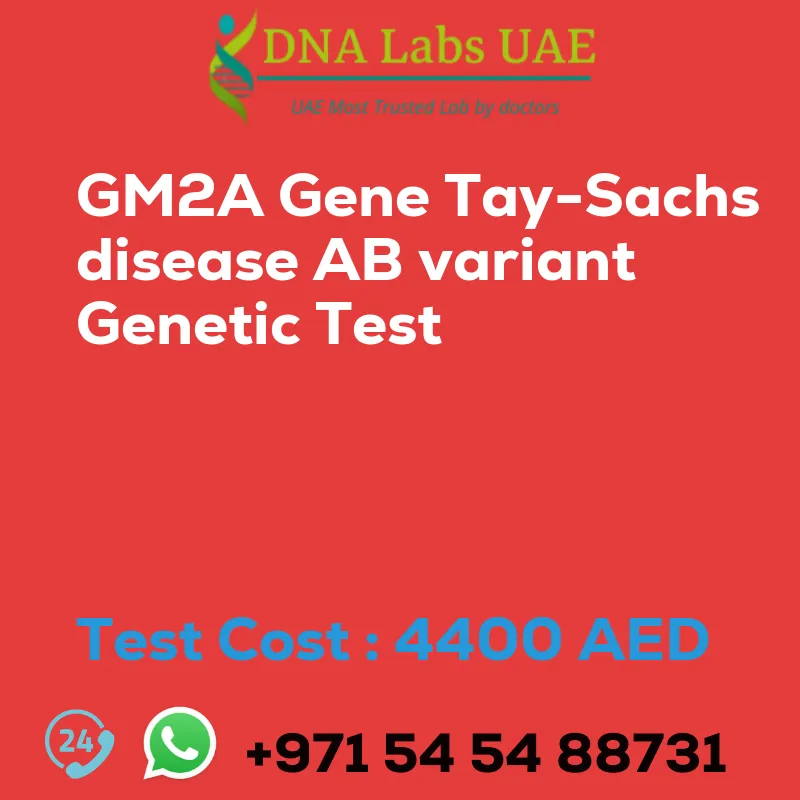GM2A Gene Tay-Sachs disease AB variant Genetic Test
At DNA Labs UAE, we offer the GM2A Gene Tay-Sachs disease AB variant Genetic Test to help diagnose and identify this rare genetic disorder. This test is specifically designed to analyze the GM2A gene and detect mutations that may be associated with Tay-Sachs disease.
Test Components
- Test Name: GM2A Gene Tay-Sachs disease AB variant Genetic Test
- Price: 4400.0 AED
- Sample Condition: Blood or Extracted DNA or One drop Blood on FTA Card
- Report Delivery: 3 to 4 Weeks
- Method: NGS Technology
- Test type: Metabolic Disorders
- Doctor: General Physician
- Test Department: Genetics
Pre Test Information
Prior to undergoing the GM2A Gene Tay-Sachs disease AB variant NGS Genetic DNA Test, it is important to provide the clinical history of the patient. Additionally, a genetic counseling session will be conducted to draw a pedigree chart of family members affected by Tay-Sachs disease AB variant.
Test Details
The GM2A gene is responsible for encoding a protein called GM2 ganglioside activator. This protein plays a crucial role in breaking down a fatty substance called GM2 ganglioside in cells. However, mutations in the GM2A gene can lead to Tay-Sachs disease, a rare genetic disorder.
Tay-Sachs disease is an autosomal recessive disorder characterized by the accumulation of GM2 ganglioside in the brain and nervous system cells. This buildup results in progressive damage to nerve cells, leading to neurodegeneration and various symptoms such as developmental delay, loss of motor skills, muscle weakness, seizures, and premature death.
The NGS (Next-Generation Sequencing) genetic testing method is utilized to analyze multiple genes simultaneously and identify genetic variations or mutations associated with specific disorders. In the case of Tay-Sachs disease, NGS genetic testing can detect mutations in the GM2A gene that may be responsible for the disease.
The AB variant of Tay-Sachs disease refers to a specific mutation in the GM2A gene associated with a milder form of the disease. Individuals with the AB variant typically experience a later onset of symptoms and a slower disease progression compared to those with the classic form of Tay-Sachs disease.
NGS genetic testing for the GM2A gene is crucial in confirming a diagnosis of Tay-Sachs disease and determining the specific variant present. This information is essential for genetic counseling, family planning, and potentially for the development of targeted therapies in the future.
For more information about the GM2A Gene Tay-Sachs disease AB variant Genetic Test or to schedule an appointment, please contact DNA Labs UAE.
| Test Name | GM2A Gene Tay-Sachs disease AB variant Genetic Test |
|---|---|
| Components | |
| Price | 4400.0 AED |
| Sample Condition | Blood or Extracted DNA or One drop Blood on FTA Card |
| Report Delivery | 3 to 4 Weeks |
| Method | NGS Technology |
| Test type | Metabolic Disorders |
| Doctor | General Physician |
| Test Department: | Genetics |
| Pre Test Information | Clinical History of Patient who is going for GM2A Gene Tay-Sachs disease AB variant NGS Genetic DNA Test A Genetic Counselling session to draw a pedigree chart of family members affected with Tay-Sachs disease AB variant |
| Test Details |
The GM2A gene is responsible for encoding a protein called GM2 ganglioside activator, which is involved in the breakdown of a fatty substance called GM2 ganglioside in cells. Mutations in the GM2A gene can lead to a rare genetic disorder called Tay-Sachs disease. Tay-Sachs disease is an autosomal recessive disorder characterized by the accumulation of GM2 ganglioside in the cells of the brain and nervous system. This buildup of GM2 ganglioside leads to progressive damage to the nerve cells, resulting in neurodegeneration and various symptoms such as developmental delay, loss of motor skills, muscle weakness, seizures, and ultimately, premature death. NGS (Next-Generation Sequencing) genetic testing is a method used to analyze multiple genes simultaneously to identify genetic variations or mutations that may be associated with a particular disorder. In the case of Tay-Sachs disease, NGS genetic testing can be used to identify mutations in the GM2A gene that may be responsible for the disease. The AB variant of Tay-Sachs disease refers to a specific mutation in the GM2A gene that is associated with a milder form of the disease. Individuals with the AB variant typically have a later onset of symptoms and a slower disease progression compared to individuals with the classic form of Tay-Sachs disease. NGS genetic testing for the GM2A gene can help confirm a diagnosis of Tay-Sachs disease and determine the specific variant present. This information is important for genetic counseling, family planning, and potentially for the development of targeted therapies in the future. |








